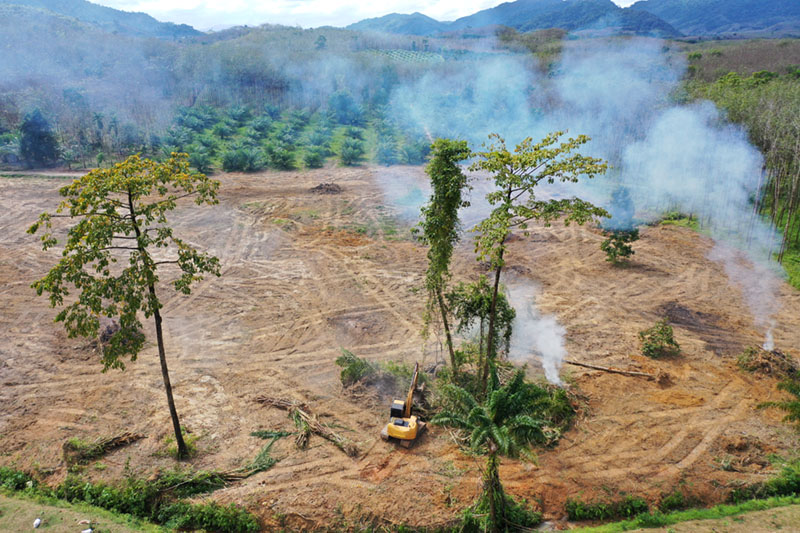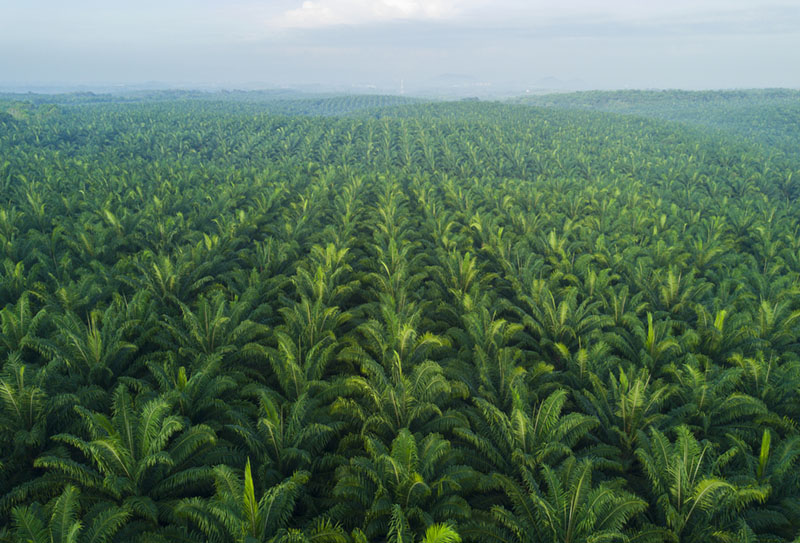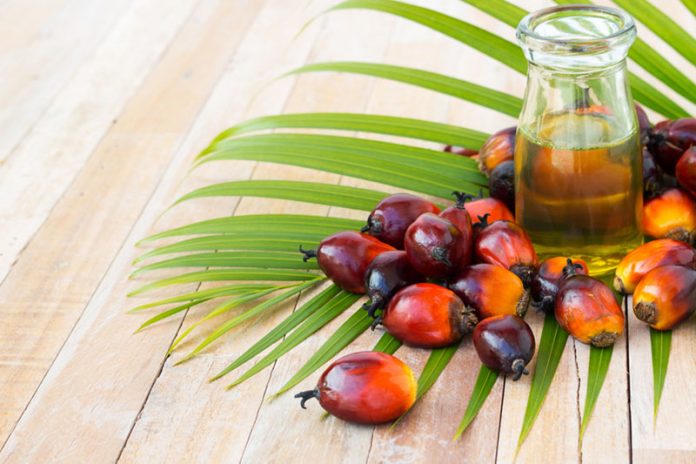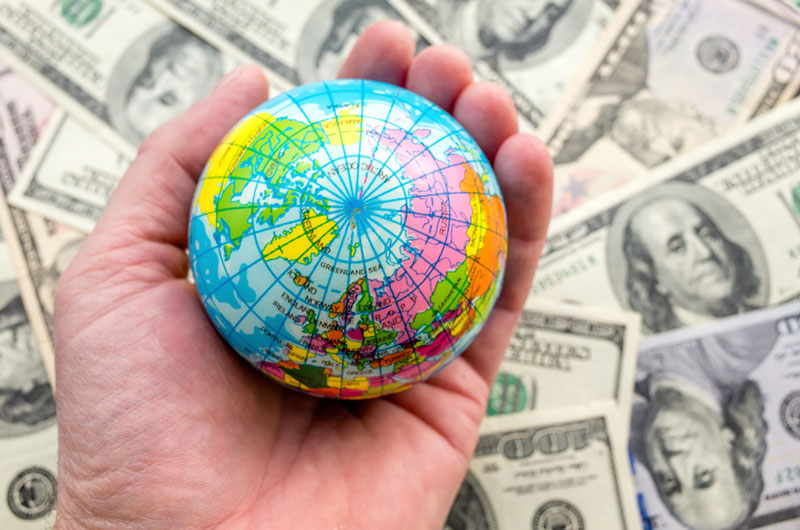When we think of orangutans or Sumatran tigers, it’s hard not to think of their homes and populations being destroyed because of palm oil. But at the same time, it’s hard to find food and body care products that don’t contain palm oil or one of its many derivatives.
This is where sustainable palm oil can step in. In our modern world, it’s nearly impossible to live without palm oil. But is it possible to use a type of palm oil that’s better for people, animals, and our planet as a whole? Let’s take a look at why a sustainable form of palm oil is essential, how to find it, and how it comes with its own set of concerns.
Environmental and Ethical Drawbacks of Palm Oil
The Guardian refers to palm oil as a “miracle ingredient”—and it truly is. It can increase the melting point of ice cream, it works as a natural preservative, it can serve as an adhesive, it makes your lipstick smoother, it makes chips crispier, and it can even improve the health of some processed foods.
We’re hooked.
When we become fixated on a certain ingredient, problems tend to follow. And in the case of palm oil, those problems have meant mass-scale deforestation, ecosystem degradation, species losses, and greenhouse gas emissions.
Palm oil comes from a tree, a trade known as the African palm oil tree, or Elaeis guineensis. Like other types of palm trees (most notably coconut), the palm oil tree produces fruit bunches. Each individual piece of fruit has a nut or kernel inside, which contains around 50% oil.
Palm oil trees have many benefits. They require significantly less land than other oil-producing crops, the oil can be harvested every month of the year, and the leftover fiber from the palm kernel can be processed into other materials. However, many of these benefits of palm oil trees have also led to the downfall of the species.
Because of how palm oil can be grown and consumed, it is now found in more than half of all packaged products that Americans consume. Everything from soap and detergent to ice cream and chocolate bars is likely to contain some form of palm oil.
Because of this, we need more land growing more palm oil. As demand for palm oil has rapidly increased, so too has production. Plantations are taking over large areas of Asia, Africa, and Latin America—often at the expense of tropical forests and the plant and animal species that called them home.


Not only is this leading to possible extinction of animals like Sumatran rhinos, Sumatran tigers, and orangutans (to name just a few), but it’s also associated with a range of human rights abuses.
In 2018, CNN reported that children as young as just eight years old are working from some of the world’s biggest brands in plantations that produce palm oil. Many of these plantation workers earn just a few dollars a day, work unlawfully long hours, and are exposed to extremely dangerous work conditions.
It’s clear that we need an alternative.
What is Sustainable Palm Oil?
We should start out by mentioning that more than 200 common ingredients are made with palm oil—even if you never see the word “palm” in the ingredient list.
So, if you’re looking for sustainable palm oil, one of the best things you can do is avoid it altogether. With some help from the Rainforest Action Network, here are some of the common ingredients that might be palm oil in incognito:
- PKO – Palm Kernel Oil (may also be written as PKs, PKOo, PHPKO, FP(K)O, or OPKO)
- Palmitate – Vitamin A or Ascorbyl Palmitate
- Palmate
- Sodium Laureth Sulphate (can also be derived from coconut or ricinus oil)
- Sodium Dodecyl Sulphate
- Sodium Lauryl Sulfoacetate
- Glyceryl Stearate
- Stearic Acid
- Steareth-2, Steareth-20
- Hydrated palm glycerides
- Sodium Stearoyl Lactylate
- Cetyl Palm
The all inclusive list of alternative names for palm oil is about 1,000 ingredients long, and growing daily! Check out the International Palm Oil Free Certification Trademark website for the full list.
Also, if you see a food product with “vegetable oil” listed in its ingredients, keep in mind that palm oil is the cheapest, and unless specified otherwise, is likely contained in that product.
Roundtable on Sustainable Palm Oil
Because no one has time to sift through thousands of confusing, science-heavy names to determine whether or not their box of cheese crackers contain palm oil, the Roundtable on Sustainable Palm Oil was established to be able to provide some peace of mind through their sustainable palm oil certification.
Made up of various sectors of the palm oil industry, including manufacturers, retailers, producers, processors, and environmental and social nongovernmental organizations, the RSPO has established a set of social and environmental criteria that must be met to receive certification.
These criteria are based on eight principles:
- Commitments to transparency
- Compliance with laws and regulations
- Commitment to economic viability
- Use of best practices
- Conservation of natural resources and biodiversity
- Consideration of employees and communities affected by palm oil production
- Responsible new planting
- Commitment to continuous improvement
If you think this sounds like it leaves a lot up to interpretation, might prioritize profit over planet, and doesn’t really ensure the most sustainable waste produced palm oil, you wouldn’t be alone. Greenpeace has stated that they believe that “the RSPO is not producing anything near to truly sustainable palm oil.”


Bear in mind that the members of the RSPO account for 40% of total palm oil production. These include companies like Colgate, PepsiCo, Procter & Gamble, and Johnson & Johnson. While not all members are certified under RSPO criteria, they are influencing the considerations of what “sustainable” really means—which has come under significant scrutiny.
According to a 2020 study, 75% of land in Indonesia and Malaysia that is certified sustainable by RSPO was forest or wildlife habitat as recently as 30 years ago. How could palm oil production on areas known to serve as habitat for endangered mammals be considered sustainable?
According to another leading environmental organization, Friends of the Earth, RSPO oil is not sustainable from an environmental or social perspective. In fact, they think it’s nothing more than greenwashing.
For more than a decade, the RSPO has been promoting what they call sustainable palm oil, but in reality, it’s still associated with large-scale deforestation and monoculture planting, large amounts of agricultural chemicals, and human rights abuses that come with cheap labor.
Final Thoughts on Sustainable Palm Oil: It’s Complicated
So, what do we, as shoppers, do?
While RSPO sustainable palm oil certainly has many downfalls, it’s currently the best we’ve got. When shopping, you can look for the RSPO Certified Sustainable Palm Oil logo—which is used exclusively in Whole Foods’ Everyday 365 line.
Many other companies, however, have failed to switch to sustainable palm oil—even those who consume tremendous amounts of the oil, like L’Oreal, Ikea, Aldi, Nestle, and Unilever. As consumers, we can continue putting the pressure on through demanding better products, sending emails, and signing petitions—like this one, for Trader Joe’s.
But we should also take the time to think about what we consume that’s made with palm oil and try to make a switch away from the ingredient completely.
Unfortunately, many brands are making changes to become totally palm oil-free, which means more reliance on other ingredients like coconut oil or soybean oil. These alternatives could provide similar—if not worse—social and environmental concerns, as they require more inputs, land, and cheap labor.
That said, if you commonly get a hankering for packaged snacks, try to make your own instead. If you use a range of body care products that have long ingredient lists, source eco-friendly shampoos, lotions, and soaps instead. Avoiding the products that are associated with palm oil or palm oil alternatives is the best thing we can do to support our planet.
That is, until the lab-grown, yeast-based palm oil alternative can be rolled out en masse.














